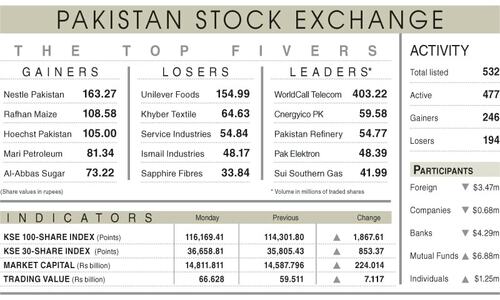KARACHI, Jan 24: Pakistan’s exports are coming under increasing impact of a double-edged sword.
One is the growing perception among foreign buyers of domestic uncertainty and the second is local exporters’ fear of recession in the US market which absorbs almost 25 per cent of total outflow of Pakistan’s goods.
“Booked export orders are being cancelled or we are being asked to hold on till further instructions for fears among foreign buyers on growing uncertainty in Pakistan,’’ Iqbal Ibrahim, chairman, All-Pakistan Textile Mills Association (Aptma), told Dawn on Thursday.
Exporters say that events after assassination of Benazir Bhutto have shaken confidence of foreign buyers who fear that their orders may not be serviced according to the schedule.
Foreign buyers fear that port operations in Pakistan may come to a standstill because of commotion,’’ said an exporter.
Equally worrisome are reports on recession that is setting in US markets where Christmas and New Year sales did not match last year’s turnover.
Markets are reporting lesser turnout of buyers as rising oil prices and impact on economy are gradually eroding purchasing capacity of US consumers.
Official statistics show that up to November 2007, Pakistan’s exports were 2.5 per cent less than the projected proportionate target of 7.57 billion dollars.
Total exports in five months were worth 7.38 billion dollars. December is the month when exports pick up, but these were affected because of Eid holidays and four days of turmoil and violence which ultimately slowed down production, hit transportation and supply and port operations.
Besides, the postponement of elections to Feb 18 further strengthened the perception about uncertainty.
Media reported 25 per cent drop in textile and clothing during December. The federal commerce secretary attributed this decline in export of textiles to extended closures of business in December. He expressed the hope that there might be some improvement in January.
“Only government can allay all such fears of foreign buyers about uncertainty in Pakistan,’’ a local business leader remarked who said that it was also up to the government to negotiate access to market in US and other countries even if there is recession.
“Our products are still very cheap for Americans,’’ he said, and wondered who else can provide them quality consumer items at such low prices as offered by Pakistan, India, Bangladesh, China and Indonesia.
Adding to these worries is the drop in gas and electricity supply to the industry. According to Iqbal Ibrahim, as many as 108 textile units suspended their operations in Punjab.
On Wednesday, the Aptma chairman led a delegation of textile businessmen for a meeting with caretaker prime minister, Mohammedmian Soomro, in Islamabad to discuss the gas and electricity-related problems.
According to an official in Islamabad, a demand of the textile industry for a three per cent research and development subsidy on export of yarn and grey cloth could not come up for discussion because of financial constraints faced by the government.“We do not want any subsidy,’’ the Aptma chairman angrily remarked, and explained that the industry merely wants a level- playing field.
“Why should government recover money from textile for subsiding gas supply to fertiliser sector,’’ he argued, and said that this subsidy should come from the government budget if it was so essential. His estimate was that this cross subsidy was pretty too heavy for the industry.
The Aptma chairman also pleaded for micro-management of gas and electricity supply to ensure uninterrupted supply of these two vital energy inputs to the industry.
An improvement in gas and electricity supply is expected to be visible within this week.
Another major issue was availability of cotton.
“India and China have adopted BT cotton and are reaping rich crops,’’ he said and wondered as to why Pakistan government is taking so much time.
“There are 104 companies dealing in BT cotton in the world,’’ he said and suggested that the government may invite four or five for a presentation.
The caretaker prime minister is expected to get a representation on BT cotton very soon.













































Dear visitor, the comments section is undergoing an overhaul and will return soon.